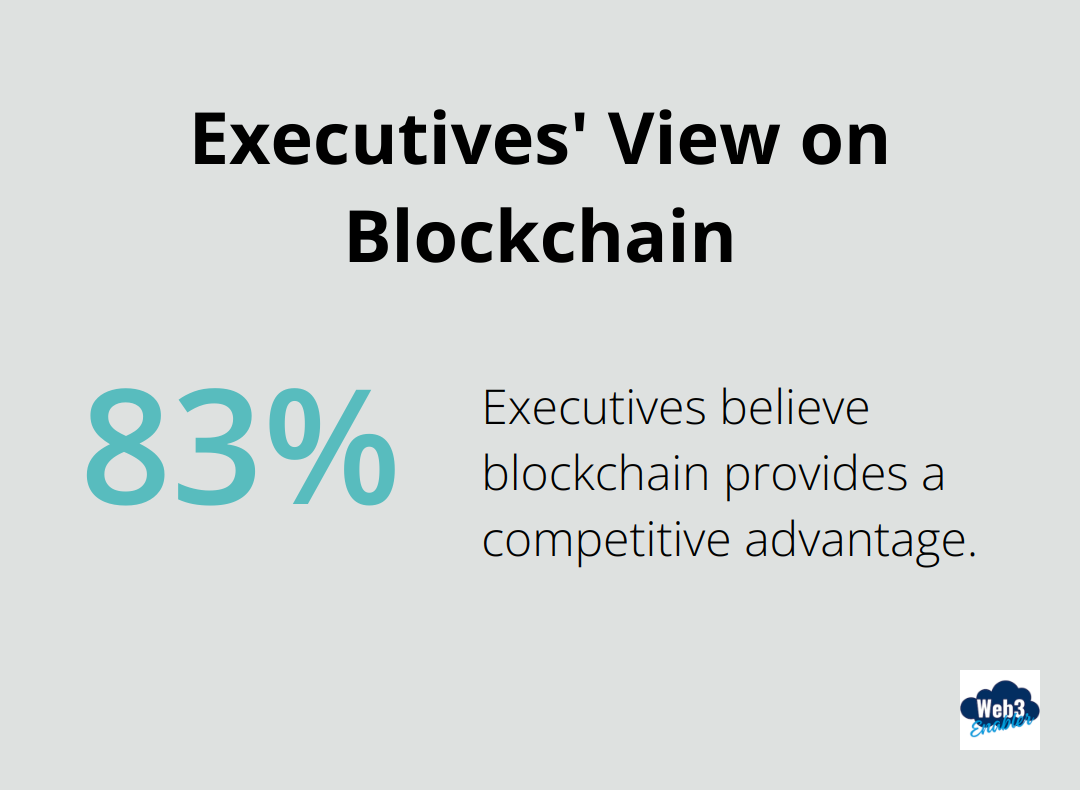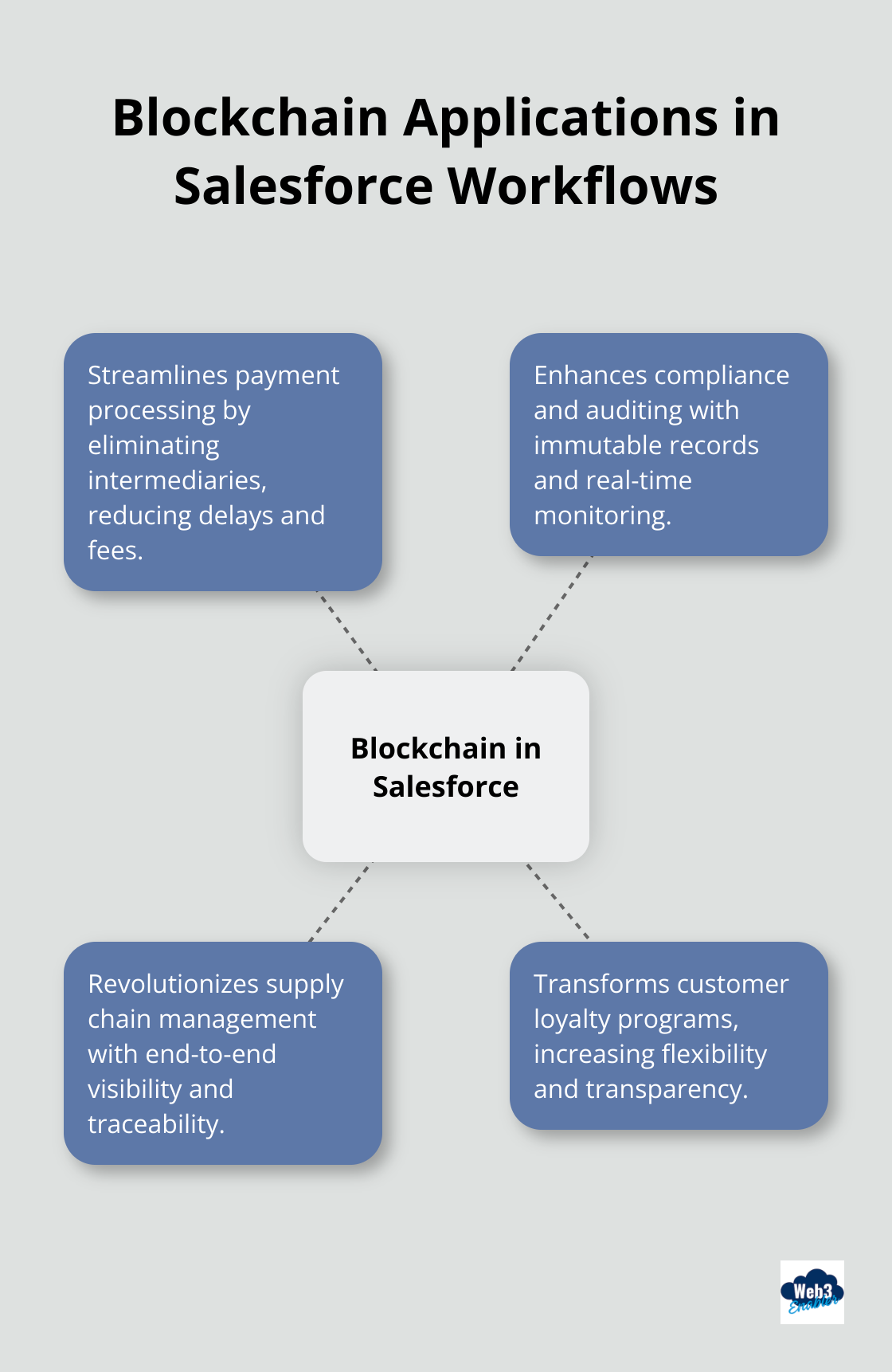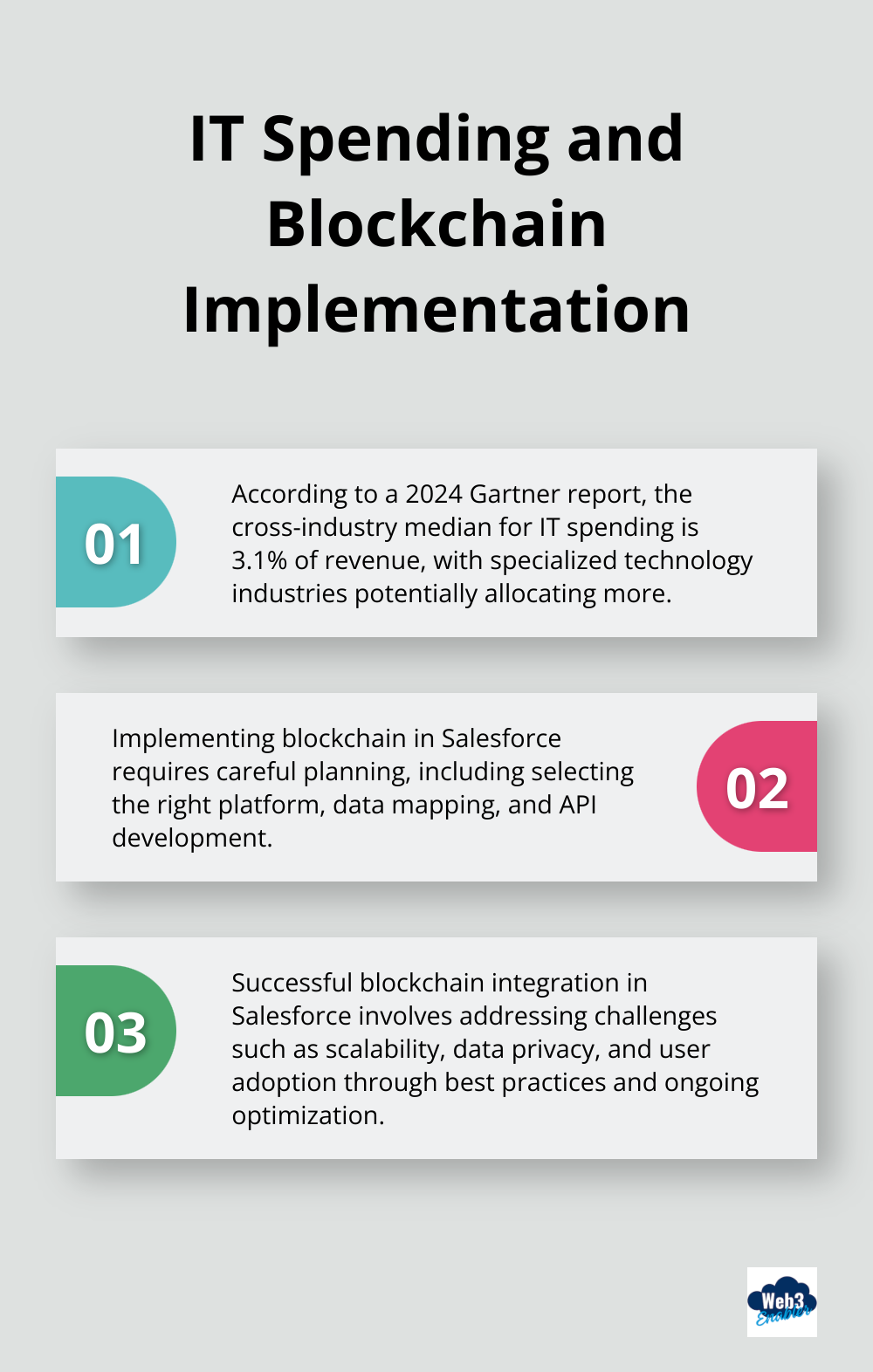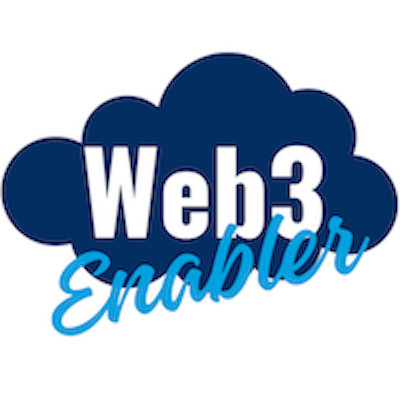 At Web3 Enabler, we’re excited about the potential of blockchain workflow solutions in modern business environments.
At Web3 Enabler, we’re excited about the potential of blockchain workflow solutions in modern business environments.
Integrating blockchain technology with Salesforce can revolutionize how companies manage their operations and interact with customers. This powerful combination offers enhanced security, transparency, and efficiency across various business processes.
In this post, we’ll explore how blockchain and Salesforce work together to optimize workflows, streamline operations, and drive business growth.
How Blockchain Enhances Salesforce
Blockchain technology transforms businesses using Salesforce. This distributed ledger records transactions across a network of computers, ensuring data integrity and security. It’s ideal for businesses handling sensitive information.
Seamless Integration with Salesforce
Salesforce customers are starting to embrace blockchain technology, recognizing its potential to transform customer relationship management. A manufacturing company using Salesforce can track its supply chain on the blockchain. An exporter can use the Blockchain to save money and time on receiving payments. A logistics company can speed up payment for every delivery action. Every step of the production process is recorded and verified (from raw material sourcing to final product delivery). This transparency reduces disputes and improves trust among all stakeholders.
Boosting Security and Efficiency
The combination of blockchain and Salesforce offers significant benefits for businesses. A study by Deloitte found that 83% of executives believe blockchain provides a competitive advantage. Here’s why:

- Enhanced Data Security: Blockchain’s cryptographic nature makes data tampering extremely difficult. This is crucial for businesses handling sensitive customer information in Salesforce.
- Improved Efficiency: Smart contracts on the blockchain automate many processes within Salesforce. This automation can reduce transaction costs by up to 30% (as reported by Accenture).
- Greater Transparency: All transactions on the blockchain are visible to authorized parties, fostering trust and reducing the need for intermediaries.
Real-World Applications
Web3 Enabler’s native blockchain solution on the Salesforce AppExchange has helped businesses streamline their operations significantly. Financial advisors using this platform can now view their clients’ cryptocurrency holdings directly within Salesforce. This integration provides a comprehensive view of a client’s financial portfolio, enabling more informed decision-making.
Moreover, businesses using this solution can accept stablecoin payments and send global payments faster and cheaper. This capability is particularly valuable in today’s global economy, where speed and cost-effectiveness are paramount.
The Future of Blockchain in Salesforce
As blockchain technology continues to evolve, its integration with Salesforce will likely expand into new areas. Businesses might soon use blockchain for:
- Advanced Customer Authentication: Blockchain could provide a more secure and efficient way to verify customer identities.
- Decentralized Data Storage: This could offer enhanced data protection and reduce the risk of data breaches.
- Automated Compliance: Smart contracts could automatically ensure businesses meet regulatory requirements.
The potential applications of blockchain within Salesforce are vast and exciting. As we move forward, businesses that adopt this technology early will likely gain a significant competitive edge in their respective markets.
How Blockchain Transforms Salesforce Workflows
Blockchain technology revolutionizes Salesforce workflows, reshaping business operations in unprecedented ways. Let’s explore some game-changing applications that are making waves in the industry.

Streamlining Payment Processing
Blockchain integration in Salesforce has improved payment processing dramatically. Traditional methods often involve multiple intermediaries, which leads to delays and high fees. Now, businesses can process payments directly, eliminating the middlemen.
Blockchain-enabled payments can streamline business processes, enhance transparency, and drive efficiency in today’s competitive landscape. This rapid processing benefits businesses operating globally, as it eliminates currency conversion delays.
Enhancing Compliance and Auditing
Compliance and auditing processes have long been pain points for businesses. The integration of blockchain with Salesforce transforms these areas, making them more efficient and less prone to errors.
Blockchain’s immutable ledger provides an unalterable record of all transactions. This feature proves invaluable for auditing purposes, as it eliminates the possibility of fraudulent alterations to records.
For businesses in highly regulated industries (such as finance or healthcare), blockchain-enabled Salesforce systems offer real-time compliance monitoring. Smart contracts can automatically flag non-compliant transactions, reducing the risk of regulatory violations.
Revolutionizing Supply Chain Management
Supply chain management is another area where blockchain makes a significant impact. The technology’s ability to provide end-to-end visibility and traceability is unparalleled.
In Salesforce, this translates to real-time updates on inventory levels, shipment statuses, and product authenticity. Businesses can now respond quickly to supply chain disruptions, reducing downtime and improving customer satisfaction.
Transforming Customer Loyalty Programs
Blockchain technology is also revolutionizing customer loyalty programs within Salesforce. Traditional loyalty programs often suffer from issues like point expiration, limited redemption options, and lack of transparency. Blockchain addresses these challenges head-on.
With blockchain-based loyalty programs, customers can easily track their points, which are stored securely on the blockchain. These points become more like digital assets, which can be transferred or even traded between users. This increased flexibility and transparency lead to higher customer engagement and satisfaction.
As we look towards the future, the potential for blockchain to further optimize Salesforce workflows seems boundless. The next frontier lies in implementing these transformative technologies effectively. Let’s explore the practical steps businesses can take to harness the power of blockchain within their Salesforce ecosystem.
How to Implement Blockchain in Salesforce
Selecting Your Blockchain Platform
The first step involves choosing the right blockchain platform. Ethereum and Hyperledger stand out as popular choices, but your decision should align with your specific needs. Ethereum excels in smart contract functionality, while Hyperledger offers more privacy features.
Web3 Enabler’s native blockchain solution on the Salesforce AppExchange offers a seamless integration experience. It eliminates the need for complex platform selection and ensures compatibility with Salesforce.
Integration Steps
After you choose your platform, follow these steps for successful integration:
- Define Your Use Case: Outline what you want to achieve with blockchain in Salesforce. Focus on specific areas like supply chain transparency or secure payments.
- Data Mapping: Identify which Salesforce data will interact with the blockchain. This step maintains data integrity across systems.
- API Development: Create APIs to facilitate communication between Salesforce and your chosen blockchain network.
- Smart Contract Development: If you use Ethereum or a similar platform, develop smart contracts to automate your business processes.
- Testing: Test your integration rigorously in a sandbox environment before going live.
Tackling Common Challenges
Implementing blockchain in Salesforce presents several challenges. Here’s how to address them:
- Scalability: Blockchain networks can struggle with high transaction volumes. Use sidechains or layer-2 solutions to handle increased throughput.
- Data Privacy: While blockchain is secure, not all data should exist on a public ledger. Implement zero-knowledge proofs or other privacy-preserving technologies to protect sensitive information.
- User Adoption: Blockchain can confuse end-users. Invest in user-friendly interfaces and comprehensive training programs to ensure smooth adoption.
Optimization Best Practices
To maximize your blockchain-Salesforce integration:
- Use Event-Driven Architecture: This approach allows real-time updates and reduces the load on your systems.
- Implement Caching: Store frequently accessed blockchain data in Salesforce to improve performance and reduce network calls.
- Conduct Regular Audits: Perform periodic audits of your smart contracts and blockchain interactions to ensure ongoing security and efficiency.
- Stay Updated: Blockchain technology evolves rapidly. Keep your team informed about the latest developments (and be prepared to update your implementation accordingly).

According to a 2024 Gartner report, the cross-industry median for IT spending is 3.1% of revenue, but industries that rely heavily on specialized technologies may allocate more.
Final Thoughts
The integration of blockchain technology with Salesforce revolutionizes business workflows. This powerful combination enhances security, transparency, and efficiency across various processes. Companies that adopt blockchain solutions early will gain a significant competitive edge in their markets.
Implementing blockchain in Salesforce requires a strategic approach. Businesses should identify specific use cases where blockchain adds the most value to their operations. Choosing the right blockchain platform and following best practices for implementation will ensure a successful integration.
Web3 Enabler’s blockchain solution provides a seamless way to integrate blockchain technology with Salesforce. As the only native blockchain solution on the Salesforce AppExchange, it offers businesses a trusted platform to leverage blockchain workflows for secure payments, improved compliance, and automation (saving time and resources).





![Flexible Payment Terms Using Stablecoin Technology [2025]](https://web3enabler.com/wp-content/uploads/emplibot/stablecoin-terms-hero-1764936594.jpeg)

